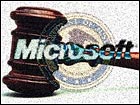|
Microsoft, DOJ strike deal
|
 |
November 1, 2001: 5:14 p.m. ET
But states may balk at reported deal that requires few Windows changes.
|
NEW YORK (CNNmoney) - Microsoft Corp. and the U.S. Justice Department have reached an agreement to settle their long-running antitrust dispute, people close to the negotiations said Thursday.
The tentative deal would place the software maker under supervision for the next five-to-seven years, and impose restrictions on the way it conducts business, but allow the company to keep its Windows software virtually unchanged. It also would allow Microsoft to protect the blueprints for its operating system, known as "source code."
While specific details of the language of the settlement were unavailable, sources said the Justice Department now seems willing to settle for weaker terms than those imposed by the original trial judge, who ruled that Microsoft held a monopoly in the market for computer operating systems and had engaged in anticompetitive business practices to maintain that monopoly.
The original judge, Thomas Penfield Jackson, had ordered Microsoft split into two companies as a remedy for anticompetitive practices. A federal appeals court overturned the breakup order but affirmed Judge Jackson's conclusion that Microsoft is an illegal monopolist.
The appeals court sent that aspect of the case back to the federal circuit court for consideration by a new judge, Colleen Kollar-Kotelly, who had ordered the two sides to settle the matter, giving them a deadline of Nov. 2.
Click here for more on the Microsoft antitrust case
The settlement deal is still under review by the attorneys general from 18 states that are co-plaintiffs in the case, and it still is not clear whether all of them will sign off on it.
Some of the states involved in the case had been reluctant to accept softer terms than they originally sought, analysts said.
Harvard Law School visiting professor John Coffee told CNNfn's Street Sweep that some of the states may continue to press federal regulators for tougher terms. If they don't get them, they may pursue litigation of their own, Coffee said. (192K WAV) or (192K AIFF)
Indeed, CNNfn learned late Thursday that Massachusetts is not prepared to go along with the proposed settlement by the Friday deadline. Sources in Attorney General Tom Reilly's office said the state wants "as much time as necessary" to be comfortable with the settlement.
|  | |
 |
 |
 |
| |
 Computer trade association exec Ed Black discusses the case with CNNfn TV's Steve Young.
Computer trade association exec Ed Black discusses the case with CNNfn TV's Steve Young.
| |
 |
And Eliot Spitzer, the New York State attorney general, wouldn't comment much on the case, but he told CNNfn's Lou Dobbs that everyone should to "stay tuned" to find out his state position on the settlement deal.
"Although a settlement as described would be positive for the company, we believe it would be premature to conclude that the company's legal issues are behind it," Merrill Lynch analyst Henry Blodget said in a research note Thursday.
Nevertheless, Blodget believes Microsoft's earnings growth rate will hold more water with investors than the legal situation.
The settlement would give the stock a boost, Blodget said, but final resolution could depend on the states.
"A settlement as broadly described would represent a positive for the company and stock," Blodget said. "Importantly, however, the states have reportedly not yet signed off on such a settlement, and without their support, the case will likely still head back to the district court."
Apart from the states' reaction, others caution that the details of the settlement have yet to be scrutinized in full.
"No one has actually seen every letter of this agreement, which of course makes it very dangerous because the devil is in the details, and the specifics of how you define words is tremendously critical," Ed Black, president of the Computer and Communications Industry Association told CNNfn TV's Before Hours Thursday (WAV 379KB) (AIFF 379KB).
Microsoft (MSFT: up $3.69 to $61.84, Research, Estimates) stock rose sharply in Nasdaq trading Thursday.
The deal would give computer makers that use the popular Windows software greater freedom to install software from other computer makers on new computers. But the deal apparently would not place significant limitations on functions that Microsoft could bundle into its Windows operating program.
It also would require Microsoft to disclose some of the technical information about Windows software sought by rivals so that their applications could work more smoothly with Windows, sources said. 
|
|
|
|
|
|

|

